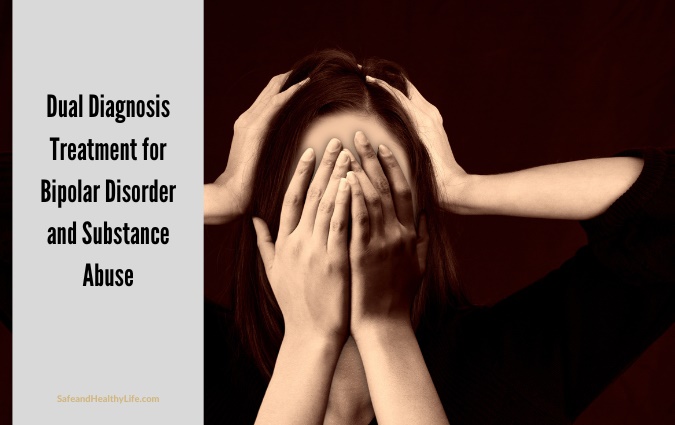Dual Diagnosis Treatment for Bipolar Disorder and Substance Abuse

Bipolar disorder and substance abuse or addictions typically coexist, and the symptoms of each disorder overlap to the point where it can be difficult to distinguish between the two.
Dual diagnosis treatment is accurate for treating both bipolar disorder and substance abuse problems.
In Dual diagnosis disorder, you have both a substance abuse problem and a mental health issue like anxiety, depression, bipolar disorder, etc. People often experience bipolar disorder and addiction at the same time.
Let us learn how they can be interlinked:
- Symptoms of bipolar disorder result in substance abuse and addiction: To cope with their symptoms, individuals with bipolar disorder consume drugs or alcohol to self-medicate them. During depressive phases, people may abuse a variety of substances for various reasons. They may take stimulants to try to lift their mood or energy level, or sedatives to divert from feelings of melancholy or hopelessness.
- Substance addiction develops bipolar disorder: Substance abuse can cause brain alterations that can contribute to the development of the bipolar disorder. Moreover, Substance usage can also prolong manic or depressed episodes, as well as make bipolar illness symptoms more severe or worse.
- Both bipolar disorder and addiction may have the same risk factors: The same reasons are likely at work in people who suffer from both illnesses at the same time. Both bipolar disorder and drug addiction are mental diseases that are caused by a complicated combination of circumstances, including hereditary abnormalities.
Recovery from alcohol and drug addiction is difficult enough, but addicts who also have bipolar disorder confront much more challenges. It is seen that the patients with bipolar disorder symptoms have difficulty becoming sober.
Similarly, for an addicted person, it is difficult to fight off the symptoms of bipolar disorder.
Keeping all these scenarios in mind, a dual diagnosis treatment is carried out by dual diagnosis treatment centers to help individuals with both symptoms.
Professionals in the field of addiction treatment now recognize the need of treating bipolar disorder and substance abuse concurrently through integrated treatment.
This integrated treatment strategy includes one-on-one appointments with a mental health professional, Dual Diagnosis support groups, family counseling, holistic therapy, etc.

Photo Credit: Pexels
Dual diagnosis treatment provides support to individuals with bipolar disorder and substance abuse to manage the symptoms and lead a healthy lifestyle. It also helps the patients to gain hope, knowledge, skills, etc. to control their symptoms.
Residential substance abuse treatment programs are one of the most effective approaches to addressing co-occurring symptoms.
During residential treatment, the patient will receive many hours of rigorous treatment per day or week, which will involve substance abuse treatment as well as mental health care.
Some forms of residential treatments are:
- Cognitive behavior therapy and Dialectical behavior therapy: CBT and DBT have been demonstrated to be effective in teaching Dual Diagnosis people how to manage their feelings and prevent being upset by mood fluctuations.
- Individual and group counseling: Group therapy is essential for your recovery from bipolar disorder and substance abuse. You will learn about the common causes and consequences of bipolar disorder via peer support groups and counseling sessions. You will be able to share your ideas and learn effective tactics from others.
- 12-step program: 12-step program method offers strong peer support groups that assist people to recover from drug use disorders, behavioral addictions, and co-occurring mental health disorders.
- Psychotherapeutic medication: Bipolar disorder is commonly treated with psychotherapeutic medication in dual diagnosis programs. To provide a broad range of therapy choices, mood-stabilizing medications might be used with antipsychotics or antidepressants.
Without therapy, a person with bipolar disorder and substance abuse or addiction would surely continue the negative cycle of using drugs or alcohol to self-medicate their mental illness symptoms.
The Dual Diagnosis treatment centers are aware of the connection between bipolar disorder and substance abuse and they can provide effective treatment for both conditions.
Hence if anyone in your circle is suffering from the same condition, encourage them to seek the help of treatment centers for dual diagnosis.
About The Author:
Dr. Boris Vaisman, MD, is a Family Medicine Specialist in Woodland Hills, CA. He graduated from the Ross University School of Medicine in 2003. He is affiliated with West Hills Hospital & Medical Center and specializes in Emergency Medicine and Family Medicine. He has unique insight into mood and behavioral disorders. He also writes blog posts about mental health and addiction. He has contributed many resources and research to substance abuse treatment centers and addiction treatment centers.

